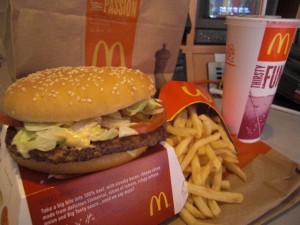The licensing effect is among the most well-known findings in behavioural economics. When people feel that they’re making a ‘good’ choice, they give themselves permission to also make bad choices. The classic – and much-mocked – example is the guy who buys a big mac and large fries in McDonalds, then orders a Diet Coke on the side. Or the office worker who buys a salad at lunchtime – then decides to grab a cake at the counter, because he’s been good.
(I have been both of these sad individuals. The licensing effect is tough to dodge.)
Could you finish it? What if it was “regular”?
This study shows the licensing effect in full, er, effect. Label a meal “small” or “regular” and people eat more of it. But there’s also a kind of reverse licensing effect – if you label something “double-size” people eat an awful lot less.
In terms of encouraging healthy eating habits, this trick is slightly double-edged. People might lose weight, but at the expense of wasting drastically more food!
Still, it’s good to remember the licensing effect, as it’s a pitfall for many a behaviour change iniative. Even if you get people to do something good, you might be inadvertently nudging them towards bad decisions too.
This blog post comes via @neilgains on Twitter – a great guy to follow for behavioural insight.

